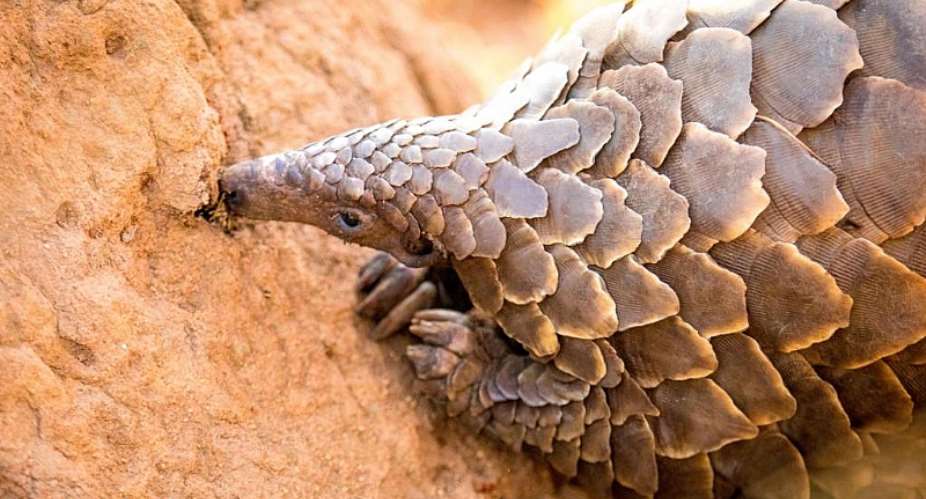South African vets have performed a world first: a blood transfusion on a Temminck's ground pangolin, a species of anteater being driven to extinction by poachers.
In a brave last-ditch attempt to save patient "Fortunate", blood was taken from a healthy pangolin and given to him. He was rescued from poachers in South Africa earlier this month.
Pangolins are the most trafficked mammal in the world. Temminck's ground pangolin (Smutsia temminckii) is no exception.
Also known as scaly anteaters, after the keratin-rich armour plating around their bodies, pangolins are targeted by poachers to meet demand for the scales used in traditional medicine in Asia. Nearly 68 tonnes of scales of African pangolins have been intercepted in Asia so far this year, according to the African Pangolin Working Group.
Given the threats, saving the life of every rescued animal is vital.
Never done before
“This was the first blood transfusion for a Temminck's ground pangolin,” said Karin Lourens, of the Johannesburg Wildlife Veterinary Hospital where the procedure was carried out.
“It has never been done for this species before. It didn't cure him, but it bought us enough time,” she said.
Though Fortunate rallied after the transfusion and was able to go out with his carers on ant-seeking night missions, sadly he ultimately succumbed. But the lessons learnt in trying to save his life will prove invaluable.
When pangolins are rescued from the hands of poachers, their health is often in a very delicate state. Fortunate had been starved for two weeks and had the claws on his front paws removed by his captors.
His levels of albumin, a protein in the blood, were low and kept dropping. He had problems absorbing and digesting food.
The only way that Lourens and her colleagues could think to save his life was to perform the blood transfusion. In dogs and cats there are ways of calculating how much blood is needed. In the case of this procedure there were no established guidelines.
“If you compare pangolins to adult cats,we should be able to take at least 50 millilitres safely from an adult pangolin, as you would from a cat. As I had no idea how much would be safe to take in apangolin, I only took 30 millilitres,” she said.
Blood donor
The donor was a healthy rescued pangolin, named Mutale, who'd been rehabilitated by the vets and not yet released.
“We have no idea yet regarding blood types in pangolins so I had no idea whether there would be any adverse reactions,” she said.
“Luckily the transfusion was uneventful.”
If saving pangolins on the operating table is difficult, administering post-operative care is equally so.
Pangolins are nocturnal, and they don't eat food from a bowl. They like fresh ants and termites and, as Fortunate had been robbed of his claws, this meant that volunteers from the surgery had to help him collect his dinner.
“We had to dig for him. He would sniff for ants and termites and he would 'show' us where to dig,” said Lourens. Typically, a supervised night-time forage for recuperating pangolins takes up to six hours.
“It is very labour-intensive and as it is at night, dangerous as well,” she said.
The Temminck's ground pangolin is one of four species of pangolin endemic to Africa. Its range extends from South Africa to Chad.
Unlike rhinos and elephants, whose iconic looks and plight at the hands of poachers are well-known, pangolins and the threats they face often go unnoticed.
Mandatory jail terms
Promisingly, in many southern African nations, poaching pangolins is punishable by heavy jail terms.
In Zimbabwe – South Africa's northern neighbour – being found in possession of a pangolin without a permit can lead to a nine-year mandatory jail term, the same penalty imposed on rhino and elephant poachers.
However, this may be about to change. A court in the southern city of Masvingo recently quashed the sentence given to three people found trying to sell a pangolin. This has raised fears of greater leniency, and a possible spike in pangolin poaching there.
Lourens says awareness about the species, wherever it lives, is key to ensuring its long-term survival.
“Pangolins are now the most poached mammal on the planet and most people have never even heard of them. How can you save something if you don't even know about its existence,” she said.





 Lay KPMG audit report on SML-GRA contract before Parliament – Isaac Adongo tells...
Lay KPMG audit report on SML-GRA contract before Parliament – Isaac Adongo tells...
 Supervisor remanded for stabbing businessman with broken bottle and screwdriver
Supervisor remanded for stabbing businessman with broken bottle and screwdriver
 NDC watching EC and NPP closely on Returning Officer recruitment — Omane Boamah
NDC watching EC and NPP closely on Returning Officer recruitment — Omane Boamah
 Your decision to contest for president again is pathetic – Annoh-Dompreh blasts ...
Your decision to contest for president again is pathetic – Annoh-Dompreh blasts ...
 Election 2024: Security agencies ready to keep peace and secure the country — IG...
Election 2024: Security agencies ready to keep peace and secure the country — IG...
 People no longer place value in public basic schools; new uniforms, painting wil...
People no longer place value in public basic schools; new uniforms, painting wil...
 'Comedian' Paul Adom Otchere needs help – Sulemana Braimah
'Comedian' Paul Adom Otchere needs help – Sulemana Braimah
 Ejisu by-election: Only 33% of voters can be swayed by inducement — Global InfoA...
Ejisu by-election: Only 33% of voters can be swayed by inducement — Global InfoA...
 Minority will expose the beneficial owners of SML, recover funds paid to company...
Minority will expose the beneficial owners of SML, recover funds paid to company...
 Prof. Opoku-Agyemang has ‘decapitated’ the NPP’s strategies; don’t take them ser...
Prof. Opoku-Agyemang has ‘decapitated’ the NPP’s strategies; don’t take them ser...
